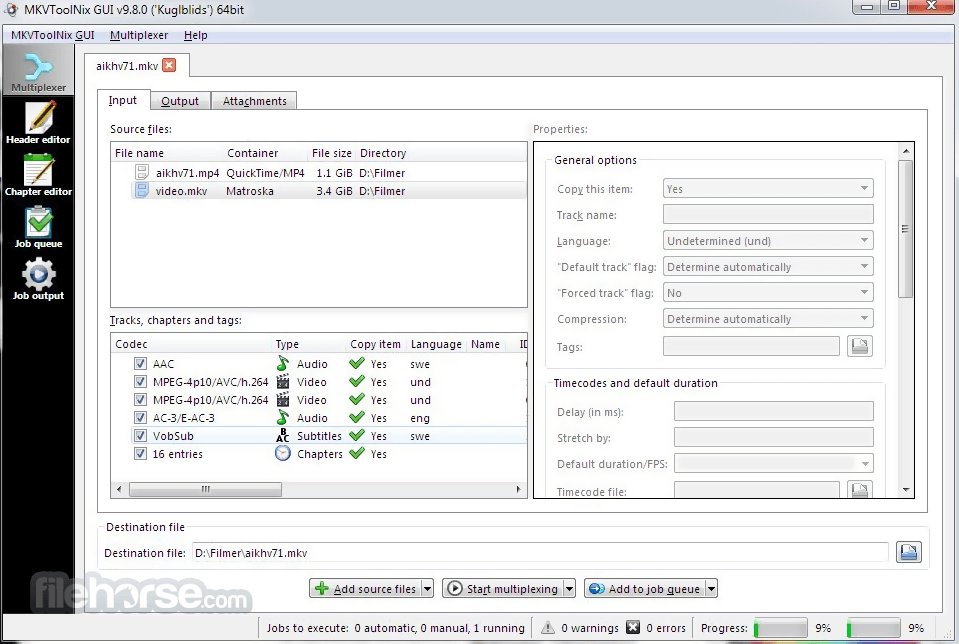-
Latest Version
-
Operating System
Windows Vista / Windows 7 / Windows 8 / Windows 10
-
User Rating
Click to vote -
Author / Product
-
Filename
mkvtoolnix-32-bit-17.0.0-setup.exe
-
MD5 Checksum
bd5190727c6bf723c01a436cc32980e5
Sometimes latest versions of the software can cause issues when installed on older devices or devices running an older version of the operating system. Software makers usually fix these issues but it can take them some time. What you can do in the meantime is to download and install an older version of MKVToolNix 17.0.0 (32-bit).
For those interested in downloading the most recent release of MKVToolNix (32-bit) or reading our review, simply click here.
All old versions distributed on our website are completely virus-free and available for download at no cost.
We would love to hear from you
If you have any questions or ideas that you want to share with us - head over to our Contact page and let us know. We value your feedback!
-
MKVToolNix 17.0.0 (32-bit) Screenshots
The images below have been resized. Click on them to view the screenshots in full size.
What's new in this version:
Important notes:
- The word "timecode" has been changed to "timestamp" everywhere it was used in MKVToolNix. This affects program output (including mkvinfo's), GUI controls, command line parameters (e.g. `mkvmerge --timestamp-scale …`) and file formats. All programs remain backwards compatible insofar as they still accept "timecode" in all those places (e.g. `mkvmerge --timecode-scale …`)
- The reason for the change is wrong usage. What both the Matroska specification and MKVToolNix used "timecode" for is normally called a "timestamp" in audio & video domains. A "timecode" on the other hand has a specific meaning. As the Matroska specification is moving towards implementing real timecodes, it will also move towards correcting the verbiage. MKVToolNix is following this change
- mkvextract's command line interface has been changed to allow extraction of multiple items at the same time. The first argument must now be the source file's name. All following arguments either set the mode (e.g. `tracks`) or specify what to extract in the currently active mode
- Those items that were written to the standard output (chapters, tags and cue sheets) are now always written to files instead. Therefore the respective modes require an output file name
For example, extracting two tracks, the chapters and the tags can be done with the following command:
- `mkvextract input.mkv tracks 0:video.h265 1:audio.aac chapters chapters.xml tags tags.xml`
- The old interface (specifying the mode first and the source file name second) remains working and supported. However, it is now deprecated and will be removed at the end of 2018
New features and enhancements:
- mkvmerge: AC-3: during identification regular AC-3 and E-AC-3 tracks will now be identified differently for most container formats (exception: AVI, Real Media, Ogg/OGM). The codec will be reported as `AC-3` for regular AC-3 and as `E-AC-3` for E-AC-3 tracks instead of the combined `AC-3/E-AC-3`
- mkvextract: the command line interface has been changed to allow extraction of multiple items at the same time. See section "Important notes" for details
Bug fixes:
- mkvmerge: AAC ADTS parser: mkvmerge will now parse the `program_config_element` if it is located at the start of an AAC frame in order to determine the actual number of channels. This overrides invalid channel configurations in the ADTS headers, for example
- mkvmerge: fixed AC-3 being misdetected as encrypted MPEG program streams under certain conditions
- mkvmerge: Dirac: under certain conditions (e.g. only muxing a single Dirac track without any other tracks) mkvmerge was always setting the pixel width & height to 123. The frame rate was wrong, too
- mkvmerge: E-AC-3 in Matroska: if AC-3 cores and their corresponding E-AC-3 extension are located in two different Matroska blocks, then mkvmerge will now re-assemble them into a single block and only use the first block's timestamp
- mkvmerge: SRT reader: fixed calculating the duration of entries starting with at a negative timestamp
- mkvmerge: VC-1: under certain conditions (e.g. only muxing a single VC-1 track without any other tracks) mkvmerge was always setting the pixel width & height to 123. The frame rate was wrong, too
- mkvmerge: command line options: an error message will be output if the single-value-form of the `--sync` option is used and it isn't a number (e.g. `--sync 0:asd`)
- mkvpropedit, GUI's header editor: both programs will now show proper error messages instead of crashing when certain kinds of data corruption is found when reading a file
 OperaOpera 109.0 Build 5097.45 (64-bit)
OperaOpera 109.0 Build 5097.45 (64-bit) iTop VPNiTop VPN 5.4.0 - Fast, Safe & Secure
iTop VPNiTop VPN 5.4.0 - Fast, Safe & Secure PhotoshopAdobe Photoshop CC 2024 25.6 (64-bit)
PhotoshopAdobe Photoshop CC 2024 25.6 (64-bit) iAnyGoTenorshare iAnyGo 4.0.15
iAnyGoTenorshare iAnyGo 4.0.15 Opera GXOpera GX 108.0.5067.43 (64-bit)
Opera GXOpera GX 108.0.5067.43 (64-bit) Adobe AcrobatAdobe Acrobat Pro 2024.002.20687
Adobe AcrobatAdobe Acrobat Pro 2024.002.20687 BlueStacksBlueStacks - Play on PC 5.21.150
BlueStacksBlueStacks - Play on PC 5.21.150 Hero WarsHero Wars - Online Action Game
Hero WarsHero Wars - Online Action Game Data Recovery4DDiG Windows Data Recovery 9.8.6
Data Recovery4DDiG Windows Data Recovery 9.8.6 TradingViewTradingView - Trusted by 50 Million Traders
TradingViewTradingView - Trusted by 50 Million Traders







Comments and User Reviews